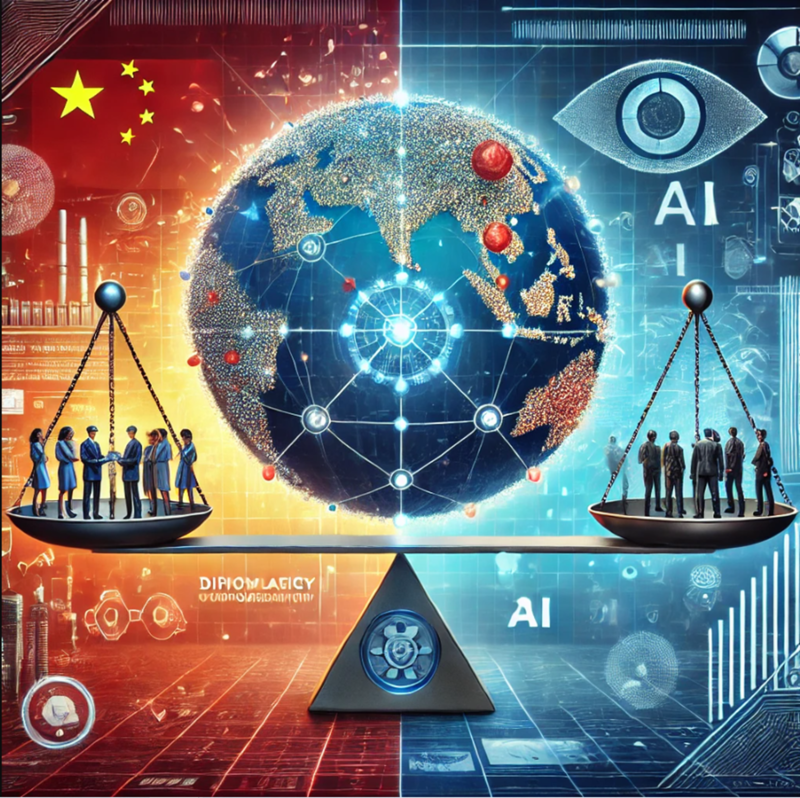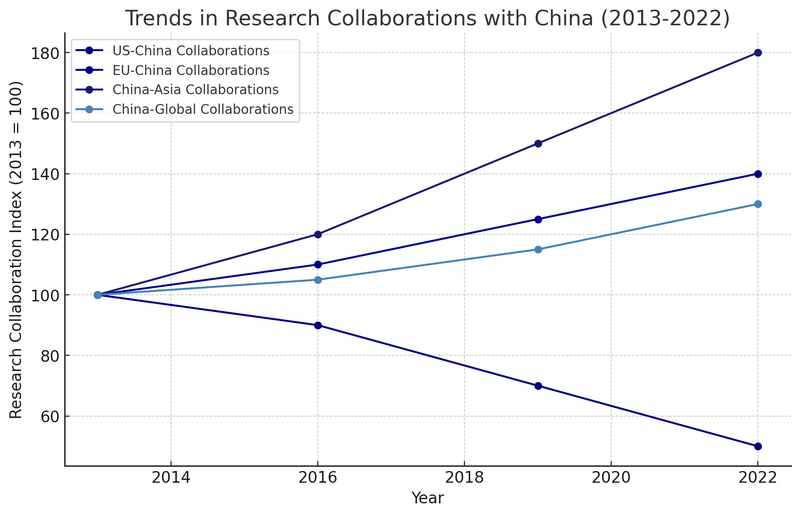Finding a "safe" way to collaborate with China on research?
Input
Modified
Collaboration in research has always been a key component of scientific advancement, encouraging creativity and cross-border knowledge sharing. However, because of economic competition, national security issues, and geopolitical tensions, research collaborations with China have grown more complicated in recent years. Countries across the world, but especially the US and Europe, are reevaluating their research partnerships with China, balancing the advantages of scientific collaboration against the hazards. The changing nature of research cooperation with China underscores important ramifications for other countries and the associated difficulties.

Particularly in vital areas like artificial intelligence (AI) and quantum computing, the US has adopted a tough posture in limiting research and technical cooperation with China. The Decoupling America’s Artificial Intelligence Capabilities from China Act is one of the most important pieces of legislation. It restricts U.S. companies and universities from conducting AI research in China or working with Chinese institutions, and it forbids the importation of AI technology and intellectual property created in China. Although American tech firms may oppose the law, it represents a larger movement in policy toward technological decoupling. This illustrates a zero-sum mentality in which technological and scientific superiority are seen as strategic advantages rather than simply commonplace worldwide breakthroughs.
Because of worries about espionage dangers in academia, China's military-civil fusion policy, which incorporates civilian research into military applications, and intellectual property theft and technology misuse, the U.S. government has increased its inspection of academic cooperation. As a result of these worries, the Department of Justice (DOJ) launched programs like the China Initiative, which investigated possible incidents of research theft. However, the initiative faced significant backlash for racial stereotyping and ultimately shut down in 2022. Concerns regarding the loss of talent and creative potential have been raised by the unintended implications of these measures, which have had a chilling impact on Chinese-American scholars and students in American colleges. According to some experts, overly securitizing research agreements could hinder scientific innovation and make it more difficult for American researchers to access important breakthroughs occurring in China.

Europe has approached scientific relationships with China in a less combative but more cautious manner than the U.S. Concerns in Europe are less about direct security threats and more about ethics, data protection, and regulatory compliance. China is viewed by the EU as a structural rival in governance and ideology, a competitor in technology and trade, and a partner in areas like public health and climate change. But the rivalry element is becoming more noticeable, which makes scholarly partnerships more closely examined. Data transfer limitations impede the transmission of research data, and stringent medical data protection laws make medical research partnerships with China more challenging. Dual-use research concerns also make it difficult for European universities to determine whether their partnerships with Chinese institutes could be used for military purposes.
Europe and China continue to have a robust scientific partnership in spite of these worries. In contrast to the U.S., where such partnerships decreased, co-publications between China and key European countries such as Germany, France, and Italy increased significantly between 2013 and 2022. This demonstrates Europe's complex strategy, which appreciates the scientific and economic advantages of cooperation with China while simultaneously acknowledging the hazards. In an effort to overcome these obstacles, European institutions have introduced research security rules and due diligence procedures to evaluate partnerships on an individual basis. While some nations, like Germany, have been more reluctant to impose legally binding laws on institutions, others, like the Netherlands and Norway, have put regulatory tools in place to protect sensitive knowledge.
Some analysts think that some scientific areas are still possible for international collaboration with China, even in the face of tightening limitations. For tackling the world's environmental problems, climate science and environmental research—in which China possesses a wealth of climate data and expertise—remain essential. Research on topics like food security and renewable energy that supports the Sustainable Development Goals (SDGs) is seen as politically neutral and advantageous to all stakeholders. Collaboration is still essential for global readiness and response in the important fields of public health and disaster mitigation. The Association of Pacific Rim Universities (APRU) and the Max Planck Society are two groups that support ongoing collaborations in these areas, prioritizing reciprocal advantages over geopolitical antagonism. China's increasing sway over international standards-setting for new technology, however, raises worries since it may reshape the regulatory landscape to support Chinese businesses and research agendas.
In addition, some academics contend that it is impractical to try to distinguish between politically sensitive and safe study topics. Like the United States, China might utilize research partnerships as a bargaining tool in trade negotiations. Furthermore, open collaboration is becoming more difficult due to worries about intellectual property and economic security. China and the West both fear intellectual property theft, which results in further restrictions on collaborative research, and European firms are concerned about losing their patented environmental innovations to Chinese rivals. The lack of trust in the world is growing, which makes it more difficult for scientists to work together freely. China is developing an independent innovation ecosystem while lowering its reliance on Western research partnerships. However, many Chinese scientists still value international collaborations to advance technical innovation, obtain international patents, and publish in prestigious publications.
China is expanding its AI research partnerships with nations in Asia, the Middle East, and Latin America. Countries such as India, Saudi Arabia, and Singapore are developing closer research partnerships with Chinese universities. While Malaysia's AI research partnerships with China and Saudi Arabia are expanding due to investments in blockchain and cloud computing, Saudi Arabia's AI research is concentrated on partnerships with Pakistan, India, and Egypt rather than Western nations. Through encouraging academic and technological exchanges among participating nations, China's Belt and Road Initiative (BRI) has contributed to the development of these collaborations. These partnerships mark the beginning of a more multipolar research ecosystem in which nations other than the conventional Western power centers are increasingly influencing the direction of science and technology.
A comprehensive, well-rounded strategy is crucial given the challenges of conducting research with China. Protecting academic freedom while enforcing risk assessments based on evidence, encouraging selective collaboration by finding projects that are beneficial but don't pose many security risks, making clear policies that allow ethical and safe cooperation, and ensuring research security without racial profiling or unnecessary restrictions are all things that governments and academic institutions should do. To guarantee that scientific discoveries benefit all parties involved while lowering risks, policymakers should also take into account frameworks for ethical AI development, data-sharing agreements, and global research governance.

Geopolitical, economic, and security concerns are becoming more and more prevalent in research collaborations with China. Europe is taking a risk-based strategy, other countries are establishing autonomous partnerships with China, and the United States is heading toward technical decoupling. The ability to navigate these obstacles with openness, diligence, and honesty will be crucial for the future of international research. In an increasingly fragmented world, ensuring that collaborative research continues to fuel global innovation will require striking the correct balance between scientific advancement and national security. The worldwide research community can strive toward a more cooperative and sustainable approach to global scientific growth by enacting practical policies and encouraging inclusive discourse.





















